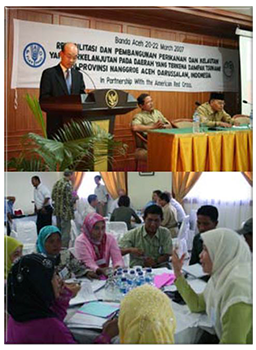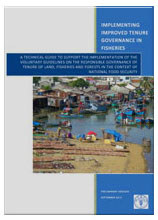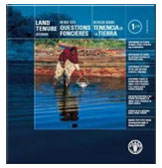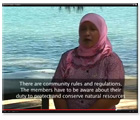Governance of tenure newsletter
Governance of Tenure Technical Guide on Fisheries! Now online:
A preliminary version of the document:
“Implementing improved governance of tenure in fisheries: a technical guide to support the implementation of the Voluntary Guidelines on the Responsible Governance of Tenure of Land, Fisheries and Forests in the Context of National Food Security”. EN
Readers are invited to submit comments and suggestions which will be considered when revising it for final publication planned for the second half of 2014.
FISHERIES TENURE
Some upcoming FAO events
11 – 30 November 2013:
JOIN THE E-CONSULTATION: Implementation of the SSF Guidelines
While the official endorsement of the SSF Guidelines of course is of critical importance, the real challenge lies in their implementation: the SSF Guidelines will only become effective if their provisions are put into practice. Accordingly, the 30th Session of the FAO Committee on Fisheries (COFI) ‘agreed on the need to develop implementation strategies for the SSF Guidelines at various levels’. The SSF Guidelines implementation will be a collaborative undertaking that requires concerted efforts by all to be successful.
3-7 February 2014:
Resumed Session of the Technical Consultation on the SSF Guidelines, Rome
13-14 March 2014:
Conference on Global Fishing Capacity, Thessaloniki
2015:
Global conference on rights-based approaches in fisheries management, Phnom Penh
Update: Development process of Voluntary Guidelines for Securing Sustainable Small-scale Fisheries
FAO is currently facilitating the negotiation of an international instrument which is complementary to the Voluntary Guidelines on the Responsible Governance of Tenure: Voluntary Guidelines for Securing Sustainable Small-Scale Fisheries in the context of food security and poverty eradication (SSF Guidelines).
The SSF Guidelines will aim to enhance the contribution of small-scale fisheries to food security and nutrition and to support the progressive realization of the right to adequate food. They seek to achieve this by empowering small-scale fishing communities to participate in decision-making, enjoy their human rights, and assume responsibilities for sustainable use of fishery resources. The SSF Guidelines will build on the Voluntary Guidelines on Responsible Governance of Tenure in the sections dealing with governance. The SSF Guidelines will however go beyond the boundaries of traditional fisheries instruments by putting emphasis also on equitable social and economic development. The SSF Guidelines will also complement the Code of Conduct for Responsible Fisheries and the Right to Food Guidelines, just to mention a few.
The final text of the SSF Guidelines is being negotiated in technical consultations: Good progress was made during the first session of the technical consultation in May 2013. A resumed session is scheduled for 3-7 February 2014. The session in May 2013 was attended by 208 people including representatives from 68 member states and the European Union, 36 representatives from CSOs and six regional fisheries bodies. Also present were the UN Special Rapporteur on the Right to Food and a representative from the Office of the High Commissioner for Human Rights.
The consultations are based on a draft developed between 2011 and early 2013 with contributions from more than 4000 stakeholders, who participated in both national and regional consultations. The major part of these consultations was organized by civil society organizations (CSOs).
• Visit our dedicated website for more information on the SSF Guidelines: EN | FR | SP
• Read the reports of national and regional consultations.
• Read the reports of national and regional consultations.

New publications on Fisheries Tenure
Preliminary version of Governance of Tenure Technical Guide: “Implementing improved governance of tenure in fisheries: a technical guide to support the implementation of the Voluntary Guidelines on the Responsible Governance of Tenure of Land, Fisheries and Forests in the Context of National Food Security”
Land Tenure Journal 1.2013: Fisheries thematic issues
Voices of Fishers
Members from fishing communities around the world talk about their perceptions on issues relating to tenure and rights over fisheries and riparian lands on which they live. Watch a selection of these testimonies on YouTube:
India - Panama - South Africa - Spain - Thailand
The statements were gathered under the ‘Voices of Fishers’ project conducted in relation to the development of the Voluntary Guidelines on the Responsible Governance of Tenure of Land, Fisheries and Forests in the Context of National Food Security by the International Collective in Support of Fishworkers (ICSF).
You may also be interested in the report of the FAO Workshop on governance of tenure for responsible capture fisheries held in July 2011.
![]() Stories from the field
Stories from the field
Indonesia: benefiting from traditional fisheries organizations in tenure governance
Panglima Laot (Sea Commander) is a fisher organisation in Aceh Province, Indonesia, which has both the genuine participatory representation of fishers at the village level and can also legitimately claim representational structures which cover a whole province or state. Benefits of this unique customary network are in particular their decorum, the freedom for expression and the consensus approach to decision making for responsible fisheries governance.
Initiated in the 16th century by the Sultan of Aceh as a village based coastal protection institution, over the last two decades the Panglima Laot has transformed into a custom based fisher organisation which functions not only at the coastal settlement (lhok) level but also at district and province level . For most of the 400 years of its existence, the Panglima Laot remained a horizontal organisation with distinct and autonomous lhoks functioning with a common customary law of the sea – hukom adat laot.
When required, information and requests move ‘up the hierarchy’ rather rapidly. Passing orders ‘down the hierarchy’ is non-existent for the simple reason that the lhok continues to be a truly autonomous entity and takes orders from none.
Read the full report: Negotiating Fisheries Co-management in Aceh Province, Indonesia. Notes on Process: EN
Cambodia : Giving fisheries a greater community-oriented focus
In 2000 major policy reforms had been initiated in Cambodia’s inland and marine fisheries giving them a greater community-oriented focus:
- Legal recognition was given to new forms of resource governance with community and government participation.
- Fifty percent of the individually owned fishing lot areas in the Tonle Sap Lake were released from the control of the influential owners and granted to rural communities around the Lake.
- Many laws and rules were changed and new ones enacted.
- The first Community Fisheries Development Department in an Asian country was started. The Community Fisheries (CFi) organizations were constituted with a Sub-Decree. Today there are 469 Community Fisheries organizations spread across Cambodia.
In February 2012 the reform process continued:
- The Prime Minister announced that fishing lot licenses in the Tonle Sap Lake would be permanently cancelled and that these areas would be reserved as conservation zones “to protect the lake’s fisheries on which tens of thousands of subsistence fishermen rely”.
The future implications of this decision for the Cambodian Community Fisheries are enormous. They will now become the main institutional arrangement, with rights of tenure and access to the fisheries resources.
This initiative highlights how Community Fisheries -- an organizational intervention which was instituted by decrees and administrative orders -- has gradually attained the potentials of becoming an important local democratic enterprise which can transform the livelihoods of an important section of the rural population of Cambodia. Whether and how this will materialize in reality depends on the confluence of many factors inter alia -- secure tenure and rights to resources; good and committed local leadership; proper planning; and adequate and appropriate funding.
Viet nam: Rethinking the use of lagoons
In 2005, biological, social and economic disarray in the largest lagoon ecosystem in Southeast Asia threatened the food, nutrition and income security of 300 000 people in Viet Nam’s Hue province who relied on the lagoon. Ponds were constructed illegally or in areas that constricted the lagoon’s tidal circulation, mangroves had been cut to make room for aquaculture development, and unregulated fishing had led to overfishing and depletion.
Today, thanks to the response of local people, and capacity development in the FAO Integrated Management of Lagoon Activities (IMOLA) project:
- A lagoon-wide census has set targets for reducing the number of aquaculture ponds;
- Essential habitats such as mangroves are being replanted;
- 26 fishery associations were set up and 9 existing ones improved, creating a means of managing activities that cover 80 percent of the lagoon’s area;
- With Geographic Information System (GIS) technology, the fisheries associations and the government made master maps and re-planned the uses of the lagoon – creating and marking areas designated for nurseries, capture fisheries and aquaculture.
Read more about the initiative: EN








